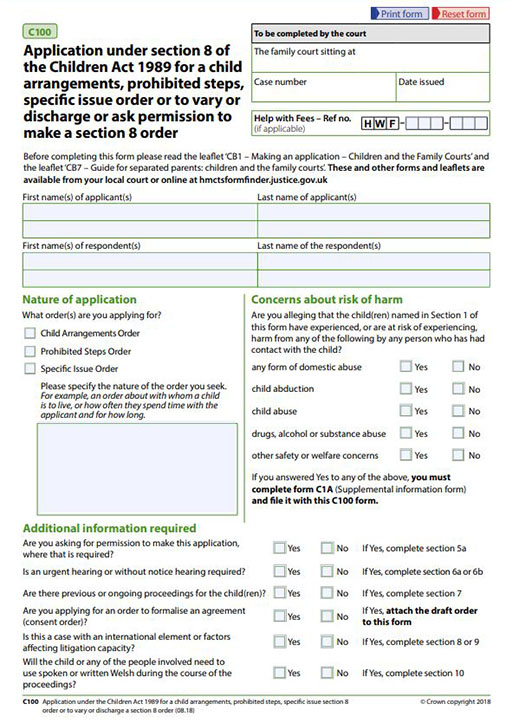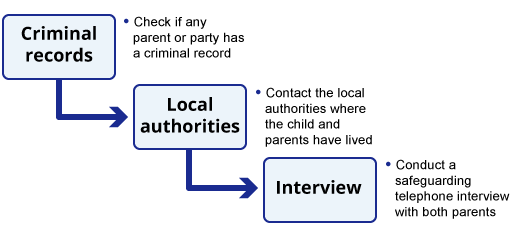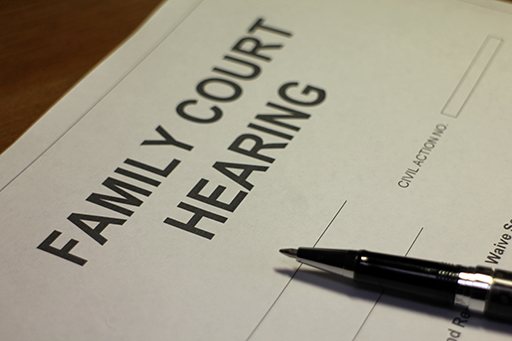Use 'Print preview' to check the number of pages and printer settings.
Print functionality varies between browsers.
Printable page generated Saturday, 28 February 2026, 2:48 PM
Cafcass
5.1 Introduction

Welcome to this training module on working with Cafcass. The Children and Family Court Advisory and Support Service (Cafcass) is a public body which promotes the welfare of children and families involved in family court proceedings in England and Wales.
In your volunteering you may be supporting clients involved in family cases where Cafcass is involved, usually proceedings involving child arrangements applications where there is a dispute over with whom a child should live and how much contact they should have with the non-resident parent.
Cafcass will typically interview the parents and, if appropriate, the child(ren) and make recommendations to the court as to what would be in the best interests of the child(ren). This training module will assist you in feeling more confident in situations where Cafcass is involved in a client’s case.
Learning outcomes
This module explains what Cafcass is, the procedure where they become involved, what to expect of the reports they will write and their involvement in court hearings.
In this module you will learn about:
- What Cafcass is
- Cafcass initial involvement and the safeguarding letter
- What a section 7 report is
- Cafcass involvement at the First Hearing Dispute Resolution Appointment (FHDRA) and
Dispute Resolution Appointment (DRA) .
This module is one of a number of training modules to help Support Through Court volunteers when supporting clients. The modules all use the same case study to explore the different aspects of supporting clients effectively. We will be referring to this example as we work though this module, so it may be helpful to remind yourself of the facts now. You may want to open this case study in a separate window (use Ctrl + click on the link) so you can refer back to it when needed. Find out more about the Johnson/Smith family and their situation.
During the module you may come across terminology which is unfamiliar to you. Some words are hyperlinked to the Glossary, so by hovering over the word you will be able to see its definition.
Finally, this module deals with some sensitive issues including domestic abuse. If you are affected by the material, Support Through Court can provide support for you. To access this support please speak to your Service Manager.
Give your opinion
How would you rate your understanding of Cafcass right now, before you start this module? Submit your answer.
5.2 What is Cafcass?
The Children and Family Court Advisory and Support Service (Cafcass) is a non-departmental public body who are independent of the courts, social services, education, health authorities and all similar agencies. Cafcass officers are experienced social workers who will work with families involved in a dispute over a child to help the court determine what is in the best interest of the child. Its role is to safeguard vulnerable children caught in disputes that will impact the child throughout their life.
Individuals and families cannot approach Cafcass directly for help and support: their involvement is triggered by family court proceedings. In appropriate cases Cafcass will produce a report within proceedings and, exceptionally, they may be invited by the court to become a
Cafcass are only involved in court proceedings that involve a child. This can be for private proceedings (typically applications for a child arrangement order issued by parents, grandparents, siblings or carers) and public child care proceedings (typically applications for a care or supervision order or an adoption order issued by social services due to serious concerns about a child’s welfare).
As parents involved in
To find out more go to the Cafcass website. Further information is also available on the Child Law Advice website.
Activity 1
Please answer the following questions; there is one correct answer for each one.
a.
True
b.
False
The correct answer is b.
b.
Cafcass is a non-departmental public body who is independent of the courts and other agencies such as social services, education and health authorities.
a.
True
b.
False
The correct answer is a.
a.
Cafcass’ main role is to safeguard the welfare of children involved in court proceedings in the family courts.
a.
True
b.
False
The correct answer is b.
b.
Individuals and families cannot approach Cafcass directly for help and support. Cafcass become involved once family court proceedings involving children are started. The court will decide the extent of their involvement.
5.3 Cafcass initial involvement and the safeguarding letter
As Cafcass is involved in family law cases involving children, all
Cafcass have targets for sending the case to the Early Intervention Team. It can take three weeks or more from submitting an application to Cafcass starting their enquiries. Therefore, it may be useful for volunteers to set realistic expectations about timescales with clients who are making applications. An early intervention officer, who is a trained social worker, will then carry out a series of checks, as follows:
What is a safeguarding telephone interview? The person from Cafcass will have a script and will ask each parent questions about issues such as domestic abuse, substance abuse and mental health. The purpose is to establish whether there are any safeguarding concerns about the child which need to be addressed urgently.
Activity 2
Following the initial safeguarding enquiries, the early intervention officer will then write a safeguarding letter to the parents. This will be a short report on the outcomes of the safeguarding checks and any child welfare issues raised in the telephone interviews with the parents. Cafcass will send this letter via email to both parents separately before the first hearing and file it at court. Here is a copy of the safeguarding letter sent to parents.
Did you know?
Cafcass will not send the letter to the parent(s) if there is information that would put the child or parent at risk. If this is the case, then a Cafcass Court Advisor will ask the judge before the first hearing whether it would be safe to send the letter.
Following the safeguarding checks, the local or regional Cafcass teams will pick up the case after the initial safeguarding letter has been sent out.
5.4 Section 7 reports
At the first hearing, the court will decide whether further investigation is needed. If the court decides that they need further information from Cafcass, they will order Cafcass to provide a more detailed report. You will hear this being referred to as a ‘Section 7’ Report. This will take place after the court has decided any disputed facts in the case at a finding of fact hearing.
The case will be allocated to a Cafcass Court Advisor who will prepare the report, which will focus on the concerns around the child’s welfare. A
The Court Advisor will create a case plan and identify any gaps in the evidence and what needs to be addressed. The report will include:
- Wider checks with agencies e.g. school,
women’s aid /drug and alcohol services, etc. - Interviews with each parent face-to-face
- An interview with the child (either at the Cafcass office, at home or at school).
Did you know?
Cafcass always try to see the child, regardless of their age. Even a young child can answer “who is in your family?”, which can give a good idea of who is and is not included within the family unit.
The Section 7 report will ultimately make recommendations to the Court. These recommendations can be tested in court by the parents to understand how and why the Court Advisor reached those conclusions. Conclusions can include:
Attendance at a course or programme
A recommendation that a party attends a course or programme, for example a
Child Contact Intervention (CCI)
A short term intervention for supervised contact where a child is reintroduced to a parent. Cafcass will fund 12 hours of work, typically over a 8 – 10 week timescale (although this may vary depending on the services available in each location). This will involve preparation with parents and the child. Contact will be supervised, and the observations relayed to Cafcass. It will only be commissioned if necessary (i.e. it is not a substitute for paying for supervised contact) and contact would then often move to a supported contact centre.
Recommendations are “stepped” to make it clear what steps need to be taken to bring the case to a close.
Activity 3
Have you been involved as a volunteer in a case involving a section 7 report? If so, did Cafcass recommend any of these orders or something different?
Comment
You may not have come across Cafcass in your volunteering yet, or you may have supported clients where Cafcass have produced section 7 reports making a variety of recommendations. If you have experienced orders other than those noted above, you may be able to find out more information about the order which was made on the Cafcass website.
5.5 Court hearings
First Hearing Dispute Resolution Appointment (FHDRA)
The first hearing will be attended by a Cafcass Court Advisor. The parents will not have met the court adviser before the first hearing. Ideally, there will have been a safeguarding letter sent to the parents and court at least three days prior to the first hearing, although it is not unusual for this deadline not to have been met and for clients to see it for the first time at the FHDRA.
On the day of the hearing, the Court Advisor will identify any outstanding safeguarding work, for example:
- Contacting the local authority
- Speaking to the parents to get an update on what has happened since the initial safeguarding letter was written
- Speaking to the child independently.
The Court Advisor may even help parents try to reach an agreement at the court, if it is safe for the parties to do so. If agreement cannot be reached at the first hearing, the Court Advisor assists the Court to determine a safe way forward for the case. This may involve the preparation of a section 7 report, discussed in the section above.
Did you know?
Where neither parent represents the child’s views, the court can arrange for the separate representation of children through the appointment of a solicitor and a Guardian from Cafcass.
We are now going to consider our case study, the Smith / Johnson family. Jazmin Johnson and Steve Smith separated some months ago following an incident of domestic abuse. Jazmin moved into emergency accommodation with the couple’s daughter, Chloe and her son from a previous relationship, Jaden. Find out more about the Johnson/Smith family and their situation.
Activity 4
Dispute Resolution Appointment (DRA)
This is a subsequent hearing in a family case involving children, usually after receipt of a further piece of information such as the section 7 report from Cafcass. The court will identify and hopefully narrow the issues, and will try and encourage the parties to resolve the matter.
Cafcass do not attend the Dispute Resolution Appointment, unless it is ordered to do so by the court. This is because this hearing is usually just for the benefit of the court to work through what it needs to do.
Final Hearing
As the name suggests, this is the final hearing of the case. The judge or magistrates will consider all of the available evidence. This will include evidence provided by the parties and any relevant Cafcass report. The court will assess the available evidence and come to a final decision based on what they believe is in the best interests of the child(ren).
The Cafcass Court Advisor who wrote the section 7 report will attend a final hearing because there is enough space and time to give evidence. They will give evidence about the recommendations in the report and can be questioned by either parent or the court.
Did you know?
If you want to find out further information about Cafcass, please see the following websites:
Give your opinion
How would you rate your understanding of Cafcass after completing this module? Submit your answer.
5.6 Your volunteering and Cafcass
This module has explained what Cafcass is, the procedure where they become involved, what to expect of the reports they will write and their involvement in court hearings.
In this module you have learned about:
- What Cafcass is
- Cafcass initial involvement and the safeguarding letter
- What a section 7 report is
- Cafcass involvement at the First Hearing Dispute Resolution Appointment (FHDRA) and Dispute Resolution Appointment (DRA).
When volunteering with clients who are involved with Cafcass, please remember:
- Cafcass are independent
- Cafcass’ priority is the welfare of the child(ren)
- Cafcass have no power to make directions, only recommendations to the court.
- Cafcass do not assess evidence or represent parents.
Support Through Court have a suite of training modules which you can complete so please do take a look at the other modules available. You can study these in any order. They include:
- Special measures
- Working with Cafcass
- Interviewing clients
- Writing statements
- Signposting clients to other organisations
- Working with vulnerable people
The domestic abuse modules are designed to be studied in order, from the first working to the third. These modules are:
- Introducing domestic abuse
- Supporting survivors of domestic abuse
- Supporting clients who are accused of perpetrating domestic abuse
Give your opinion
Well done, you have completed this module.
How much will it help you in your volunteering when working with Cafcass? Submit your answer.
5.7 Quiz
This self-assessment quiz contains 5 questions and is a great way to check your understanding of what you have learned in this module on Cafcass.
The pass mark is 60% and you have unlimited attempts at the quiz. This self-assessment quiz does not count towards your digital badge.
Go to the Cafcass quiz now.
Acknowledgements
Grateful acknowledgement is made to the following sources:
Every effort has been made to contact copyright holders. If any have been inadvertently overlooked the publishers will be pleased to make the necessary arrangements at the first opportunity.
Important: *** against any of the acknowledgements below means that the wording has been dictated by the rights holder/publisher, and cannot be changed.
266000: 5.1 Cafcass logo: Cafcass
266013: C100 application form: C100 Application under section 8 of the Children Act 1989 for a child arrangements, prohibited steps, specific issue order or to vary or discharge or ask permission to make a section 8 order, available online at: https://www.gov.uk/government/publications/form-c100-application-under-the-children-act-1989-for-a-child-arrangements-prohibited-steps-specific-issue-section-8-order-or-to-vary-or-discharge. Reproduced under the terms of the OGL, www.nationalarchives.gov.uk/doc/open-government-licence
266019: 5.4 preparing report: Dmitrii Shironosov / 123RF
273542: 5.5 family court hearing: Hailshadow / iStock / Getty Images Plus



